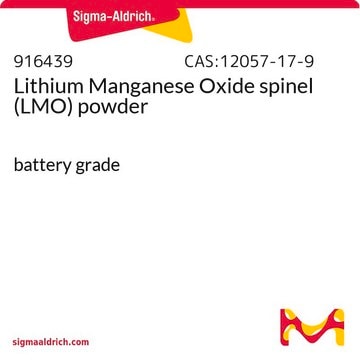482277
Lithium manganese(III,IV) oxide
electrochemical grade
Synonym(s):
LMO
About This Item
Recommended Products
grade
electrochemical grade
Quality Level
form
powder
greener alternative product characteristics
Design for Energy Efficiency
Learn more about the Principles of Green Chemistry.
sustainability
Greener Alternative Product
concentration
59.8-61.7% Mn (by KMnO4, titration)
impurities
≤20000 ppm Trace Metal Analysis
particle size
<5 μm
mp
>400 °C (lit.)
application(s)
battery manufacturing
greener alternative category
SMILES string
[Li+].[O-][Mn]=O.O=[Mn]=O
InChI
1S/Li.2Mn.4O/q+1;;;;;;-1
InChI key
VLXXBCXTUVRROQ-UHFFFAOYSA-N
Looking for similar products? Visit Product Comparison Guide
General description
Application
Storage Class Code
11 - Combustible Solids
WGK
WGK 3
Flash Point(F)
Not applicable
Flash Point(C)
Not applicable
Regulatory Listings
Regulatory Listings are mainly provided for chemical products. Only limited information can be provided here for non-chemical products. No entry means none of the components are listed. It is the user’s obligation to ensure the safe and legal use of the product.
PRTR
Class I Designated Chemical Substances
ISHL Indicated Name
Substances Subject to be Indicated Names
ISHL Notified Names
Substances Subject to be Notified Names
JAN Code
482277-VAR:
482277-100G:
482277-25G:4548173942520
482277-BULK:
Choose from one of the most recent versions:
Already Own This Product?
Find documentation for the products that you have recently purchased in the Document Library.
Customers Also Viewed
Articles
Nanomaterials for Energy Storage in Lithium-ion Battery Applications
HEVs address rising fuel costs and emissions concerns, utilizing battery packs alongside internal combustion engines for enhanced performance.
Professor Qiao's review explores stable microstructures for lithium metal fluoride batteries, advancing energy storage technologies.
Solid oxide fuel cells and electrolyzers show potential for chemical-to-electrical energy conversion, despite early development stages.
Our team of scientists has experience in all areas of research including Life Science, Material Science, Chemical Synthesis, Chromatography, Analytical and many others.
Contact Technical Service














